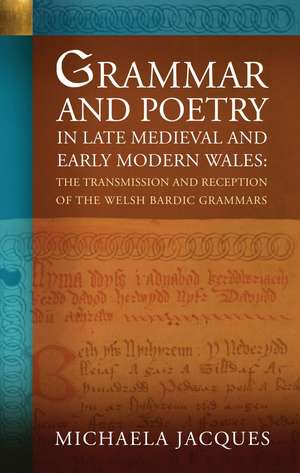Grammar and Poetry in Late Medieval and Early Modern Wales: The Transmission and Reception of the Welsh Bardic Grammars
Autor Michaela Jacquesen Limba Engleză Paperback – 29 mai 2024
The medieval Welsh bardic grammars were composed and transmitted during a period of intense social and political change in Wales. These documents began their life as essentially vernacular artes poetriae. However, from the early fourteenth century to the end of the sixteenth, they were recopied and revised over and over by bards, bureaucrats, antiquarians, humanists, and the readers and reciters of poetry. Grammar and Poetry in Late Medieval and Early Modern Wales: The Transmission and Reception of the Welsh Bardic Grammars weaves a close textual analysis of these revisions into a broader consideration of the historical contexts that gave rise to each subsequent version. It grants English-speaking scholars who wish to work comparatively with Welsh material access to these texts for the first time. Based on extensive archival research, this book contains transcriptions and translations of a great deal of material that has not previously appeared in any publication.
Preț: 348.58 lei
Nou
Puncte Express: 523
Preț estimativ în valută:
66.73€ • 69.37$ • 55.33£
66.73€ • 69.37$ • 55.33£
Carte disponibilă
Livrare economică 16-30 ianuarie 25
Livrare express 02-08 ianuarie 25 pentru 30.58 lei
Preluare comenzi: 021 569.72.76
Specificații
ISBN-13: 9781837720996
ISBN-10: 1837720991
Pagini: 344
Dimensiuni: 138 x 216 x 23 mm
Greutate: 0.4 kg
Editura: University of Wales Press
Colecția University of Wales Press
ISBN-10: 1837720991
Pagini: 344
Dimensiuni: 138 x 216 x 23 mm
Greutate: 0.4 kg
Editura: University of Wales Press
Colecția University of Wales Press
Notă biografică
Michaela Jacques is a scholar whose research concentrates on medieval and early modern Welsh literature and intellectual history. She earned her PhD in Celtic Languages and Literatures from Harvard University.
Cuprins
List of Tables
List of Abbreviations
Acknowledgements
Introduction
I.Background
Latin and Vernacular Grammar
Latin and Bardic Education
II.The Bardic Grammars
Authorship
Date
Content
Versions
Manuscripts
III.This Book
Chapter 1: A Welsh ars poetriae
I.Order of Composition
II.Latin Context
III.The Peniarth 20 Revision
Chapter 2: Tools for Reading
I.Literate Orientation and Archaism
II.Grammatica and Scientia Interpretandi
III.The Vernacular Canon
IV.The Readers and Reciters of Poetry
Chapter 3: ‘Bardic’ Grammars
I.Cynghanedd
Peniarth 126
Llanstephan 55
Peniarth 161
II.Syllables and Diphthongs
Bangor 1
Peniarth 189
Llanstephan 55
III.Evidence from the Poetic Corpus
Chapter 4: Official Documents
I.The Eisteddfodau and the Statute of Gruffudd ap Cynan
II.Artificial Abbreviations
III.Cerdd Dafod and Cerdd Dant
Chapter 5: Bardic Humanism
I.Bards and Humanists
II.Salesbury’s Books and Lily’s Grammar
III.Renaissance Rhetoric
IV.The Return Ad Fontes
Conclusion
Appendix: Translation of the Red Book of Hergest
Notes on the translation
List of Abbreviations
Acknowledgements
Introduction
I.Background
Latin and Vernacular Grammar
Latin and Bardic Education
II.The Bardic Grammars
Authorship
Date
Content
Versions
Manuscripts
III.This Book
Chapter 1: A Welsh ars poetriae
I.Order of Composition
II.Latin Context
III.The Peniarth 20 Revision
Chapter 2: Tools for Reading
I.Literate Orientation and Archaism
II.Grammatica and Scientia Interpretandi
III.The Vernacular Canon
IV.The Readers and Reciters of Poetry
Chapter 3: ‘Bardic’ Grammars
I.Cynghanedd
Peniarth 126
Llanstephan 55
Peniarth 161
II.Syllables and Diphthongs
Bangor 1
Peniarth 189
Llanstephan 55
III.Evidence from the Poetic Corpus
Chapter 4: Official Documents
I.The Eisteddfodau and the Statute of Gruffudd ap Cynan
II.Artificial Abbreviations
III.Cerdd Dafod and Cerdd Dant
Chapter 5: Bardic Humanism
I.Bards and Humanists
II.Salesbury’s Books and Lily’s Grammar
III.Renaissance Rhetoric
IV.The Return Ad Fontes
Conclusion
Appendix: Translation of the Red Book of Hergest
Notes on the translation
Recenzii
This is a ground-breaking volume. It advances our understanding of these important grammatical texts from medieval Wales in many ways, particularly to demonstrate that the neglected later versions have been modified by contact with contemporary grammatical scholarship in England. This volume is required reading for all those interested in these intellectual developments in this period.
In this first thoroughgoing assessment of the Welsh bardic grammars in more than a generation, Jacques shows us that the grammars from the outset represent active, intentional engagement with the Latin grammatical tradition, mined for tools suitable to accurate description of the Welsh language. Over the course of time, the grammars were revised, abridged, updated and excerpted to serve audiences ranging from beginning readers, to the literate elite, to poets, to performers, in an ongoing dynamic process adapting them to the cultural needs of each historical moment in turn.
This is a book for which we have been waiting a very long time. It is a compelling study of the medieval Welsh grammatical tradition from the earliest texts to the Renaissance – a huge achievement in itself. What is more, Jacques has added to that achievement the inestimable service of providing the first full, scholarly English translation of any of the Welsh bardic grammars. I am confident that we will see a great resurgence of interest in these fascinating texts as a result of the present study.
